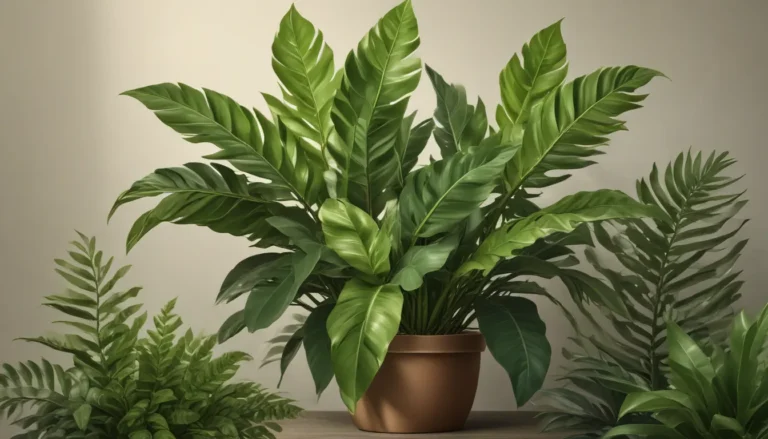The pictures we use in our articles might not show exactly what the words say. We choose these pictures to make you interested in reading more. The pictures work together with the words but don’t take their place. The words still tell you the important facts.
Ficus plants have captured the hearts of plant enthusiasts worldwide with their diverse shapes, unique leaves, and impressive lifespans. Whether you are a seasoned gardener or a budding green thumb, exploring the realm of ficus plants can open doors to a treasure trove of captivating information. In this article, we will uncover 11 intriguing facts about ficus plants that will enhance your knowledge and appreciation for these remarkable botanical wonders.
Exploring the Enigmatic Ficus Genus
Ficus belongs to a fascinating genus of flowering plants in the family Moraceae, encompassing over 800 species of trees, shrubs, and vines commonly known as figs. These plants thrive in various regions across the world, including tropical and subtropical climates. The diversity within the Ficus genus offers a wide array of shapes, sizes, and foliage that cater to different preferences and environments.
Diverse Characteristics of Ficus Plants
The Ficus genus showcases a remarkable diversity, ranging from small houseplants to towering trees that command attention. Some species of ficus plants boast aerial roots that cascade down from branches, creating a captivating visual spectacle, while others form dense leafy canopies that add a touch of greenery to any space.
Unique Traits of Ficus Leaves
One of the defining features of ficus plants is their distinctive leaves, which come in a variety of shapes such as oval, heart-shaped, and elongated. The leaves can exhibit a glossy or matte texture, with unique patterns or variegations that add depth and character to the plant's overall aesthetic.
Longevity of Ficus Trees
Many species of ficus trees have earned a reputation for their impressive lifespans, with some individuals living for several hundred years. These ancient ficus trees often hold cultural and historical significance, revered as landmarks of resilience and endurance in the natural world.
Intriguing Pollination Process of Ficus Plants
Ficus plants engage in a fascinating pollination process involving specific wasp species. The mutualistic relationship between fig wasps and ficus trees plays a crucial role in the reproductive cycle, with the wasps aiding in pollination while the trees provide a nurturing environment for the development of wasp larvae.
Versatility of Ficus Plants
Ficus plants exhibit remarkable adaptability, thriving in both indoor and outdoor settings. Whether as a striking indoor houseplant or a majestic outdoor tree, ficus plants can flourish in a wide range of conditions, making them versatile additions to any garden or living space.
Medicinal Uses of Ficus Plants
Across various cultures, different parts of the ficus plant have been utilized in traditional medicine for their healing properties. Extracts from ficus leaves, bark, or roots have been valued for their anti-inflammatory, antimicrobial, and antidiabetic properties, showcasing the plant's multifaceted benefits.
Air-Purifying Abilities of Ficus Plants
According to NASA's Clean Air Study, specific species of ficus plants have been found to effectively remove harmful airborne pollutants like formaldehyde and benzene from indoor environments. This natural air-purifying quality makes ficus plants a valuable addition to any indoor space, promoting cleaner and healthier living environments.
Spiritual and Cultural Significance of Ficus Plants
In regions like India and Southeast Asia, ficus plants, particularly the sacred fig (Ficus religiosa), hold profound religious and spiritual importance. These plants are often revered near temples and considered sacred by followers of various faiths, highlighting their symbolic significance in cultural landscapes.
Resilience and Adaptability of Ficus Plants
Ficus plants are renowned for their resilience and ability to thrive under diverse environmental conditions. Their capacity to withstand fluctuations in temperature and light levels underscores their adaptability, making them reliable and enduring companions in the world of plants.
Artistic and Mythological Representations of Ficus Plants
Throughout history, ficus plants have been celebrated in various works of art, literature, and mythology as symbols of fertility, strength, growth, and wisdom. Their presence in cultural narratives and artistic expressions reflects the enduring allure and symbolism associated with these botanical marvels.
Conclusion
In conclusion, the world of ficus plants offers a rich tapestry of intriguing facts and benefits that appeal to plant enthusiasts and homeowners alike. From their diverse species and unique characteristics to their medicinal uses and cultural significance, ficus plants stand out as versatile and captivating botanical wonders.
With their resilience, air-purifying abilities, and symbolic value, ficus plants not only enhance the aesthetic appeal of any space but also contribute to a healthier and more vibrant environment. Consider adding a touch of greenery and elegance to your home or garden with ficus plants, and embark on a journey of discovery and appreciation for these remarkable botanical treasures.
FAQs: Exploring Ficus Plants
Q: How often should I water my Ficus plant?
A: Ficus plants generally prefer moderate watering. Allow the top inch of soil to dry out before watering again to prevent root rot.
Q: Can I keep my Ficus plant indoors?
A: Yes, Ficus plants thrive in indoor environments but require adequate sunlight. Place them near a window where they can receive indirect light.
Q: What is the best location for my outdoor Ficus plant?
A: Outdoor Ficus plants thrive in full or partial sunlight. Choose a location with sufficient light and protection from extreme temperatures and harsh winds.
Q: Do Ficus plants require special care?
A: While Ficus plants are low-maintenance, regular pruning is recommended to maintain their shape. Avoid frequent changes in their environment to ensure optimal growth.
Q: Are Ficus plants safe for pets?
A: Ficus plants are not toxic to humans but can cause digestive issues in pets if ingested. Keep Ficus plants out of reach of curious pets to prevent any complications.
Embark on a botanical exploration beyond ficus plants and discover the remarkable qualities of rubber plants, sycamore fig trees, and weeping figs. These captivating flora species offer a wealth of unique traits and characteristics that will enrich your understanding and appreciation of the natural world. Join us in unraveling the extraordinary facts behind these remarkable plants and expand your botanical knowledge with each fascinating discovery.
Was this page helpful?
Our dedication to delivering reliable and engaging content drives us to provide you with a wealth of trustworthy information sourced from real contributors like you. Each fact undergoes a meticulous review process by our experienced editors to ensure accuracy and credibility, guaranteeing that the information you receive is both captivating and authentic. Trust in our commitment to quality and authenticity as you delve into the world of fascinating flora and expand your knowledge with us.






